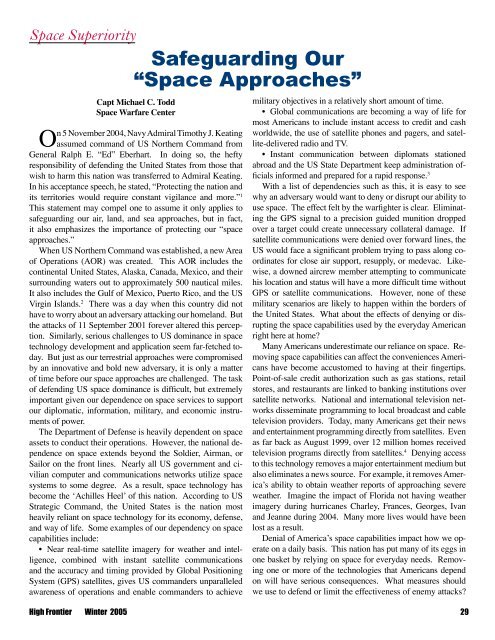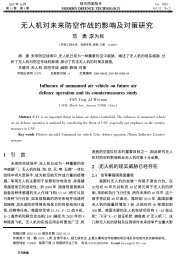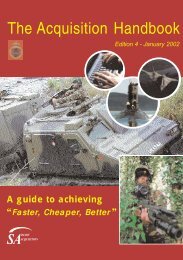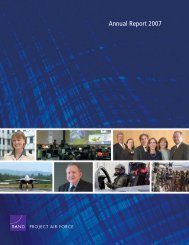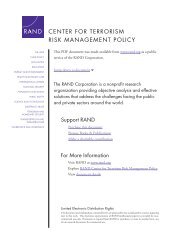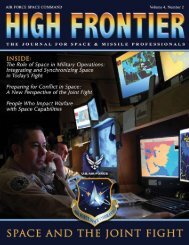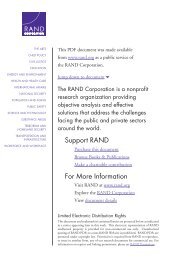Space Superiority
Space Superiority
Space Superiority
Create successful ePaper yourself
Turn your PDF publications into a flip-book with our unique Google optimized e-Paper software.
<strong>Space</strong> <strong>Superiority</strong><br />
Safeguarding Our<br />
“<strong>Space</strong> Approaches”<br />
Capt Michael C. Todd<br />
<strong>Space</strong> Warfare Center<br />
On 5 November 2004, Navy Admiral Timothy J. Keating<br />
assumed command of US Northern Command from<br />
General Ralph E. “Ed” Eberhart. In doing so, the hefty<br />
responsibility of defending the United States from those that<br />
wish to harm this nation was transferred to Admiral Keating.<br />
In his acceptance speech, he stated, “Protecting the nation and<br />
its territories would require constant vigilance and more.” 1<br />
This statement may compel one to assume it only applies to<br />
safeguarding our air, land, and sea approaches, but in fact,<br />
it also emphasizes the importance of protecting our “space<br />
approaches.”<br />
When US Northern Command was established, a new Area<br />
of Operations (AOR) was created. This AOR includes the<br />
continental United States, Alaska, Canada, Mexico, and their<br />
surrounding waters out to approximately 500 nautical miles.<br />
It also includes the Gulf of Mexico, Puerto Rico, and the US<br />
Virgin Islands. 2 There was a day when this country did not<br />
have to worry about an adversary attacking our homeland. But<br />
the attacks of 11 September 2001 forever altered this perception.<br />
Similarly, serious challenges to US dominance in space<br />
technology development and application seem far-fetched today.<br />
But just as our terrestrial approaches were compromised<br />
by an innovative and bold new adversary, it is only a matter<br />
of time before our space approaches are challenged. The task<br />
of defending US space dominance is difficult, but extremely<br />
important given our dependence on space services to support<br />
our diplomatic, information, military, and economic instruments<br />
of power.<br />
The Department of Defense is heavily dependent on space<br />
assets to conduct their operations. However, the national dependence<br />
on space extends beyond the Soldier, Airman, or<br />
Sailor on the front lines. Nearly all US government and civilian<br />
computer and communications networks utilize space<br />
systems to some degree. As a result, space technology has<br />
become the ‘Achilles Heel’ of this nation. According to US<br />
Strategic Command, the United States is the nation most<br />
heavily reliant on space technology for its economy, defense,<br />
and way of life. Some examples of our dependency on space<br />
capabilities include:<br />
• Near real-time satellite imagery for weather and intelligence,<br />
combined with instant satellite communications<br />
and the accuracy and timing provided by Global Positioning<br />
System (GPS) satellites, gives US commanders unparalleled<br />
awareness of operations and enable commanders to achieve<br />
military objectives in a relatively short amount of time.<br />
• Global communications are becoming a way of life for<br />
most Americans to include instant access to credit and cash<br />
worldwide, the use of satellite phones and pagers, and satellite-delivered<br />
radio and TV.<br />
• Instant communication between diplomats stationed<br />
abroad and the US State Department keep administration officials<br />
informed and prepared for a rapid response. 3<br />
With a list of dependencies such as this, it is easy to see<br />
why an adversary would want to deny or disrupt our ability to<br />
use space. The effect felt by the warfighter is clear. Eliminating<br />
the GPS signal to a precision guided munition dropped<br />
over a target could create unnecessary collateral damage. If<br />
satellite communications were denied over forward lines, the<br />
US would face a significant problem trying to pass along coordinates<br />
for close air support, resupply, or medevac. Likewise,<br />
a downed aircrew member attempting to communicate<br />
his location and status will have a more difficult time without<br />
GPS or satellite communications. However, none of these<br />
military scenarios are likely to happen within the borders of<br />
the United States. What about the effects of denying or disrupting<br />
the space capabilities used by the everyday American<br />
right here at home?<br />
Many Americans underestimate our reliance on space. Removing<br />
space capabilities can affect the conveniences Americans<br />
have become accustomed to having at their fingertips.<br />
Point-of-sale credit authorization such as gas stations, retail<br />
stores, and restaurants are linked to banking institutions over<br />
satellite networks. National and international television networks<br />
disseminate programming to local broadcast and cable<br />
television providers. Today, many Americans get their news<br />
and entertainment programming directly from satellites. Even<br />
as far back as August 1999, over 12 million homes received<br />
television programs directly from satellites. 4 Denying access<br />
to this technology removes a major entertainment medium but<br />
also eliminates a news source. For example, it removes America’s<br />
ability to obtain weather reports of approaching severe<br />
weather. Imagine the impact of Florida not having weather<br />
imagery during hurricanes Charley, Frances, Georges, Ivan<br />
and Jeanne during 2004. Many more lives would have been<br />
lost as a result.<br />
Denial of America’s space capabilities impact how we operate<br />
on a daily basis. This nation has put many of its eggs in<br />
one basket by relying on space for everyday needs. Removing<br />
one or more of the technologies that Americans depend<br />
on will have serious consequences. What measures should<br />
we use to defend or limit the effectiveness of enemy attacks?<br />
High Frontier Winter 2005 29


